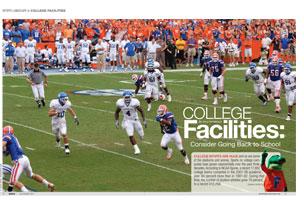
College sports are huge and so are some of the stadiums and arenas. Sports on college campuses have grown exponentially over the past three decades. According to NCAA figures, a record 17,682 college teams competed in the 2007-08 academic year, 60 percent more than in 1981-82. During that time, the number of student-athletes grew 78 percent, to a record 412,768.
 |
| © James Elliot - Dreamstime.com |
The growth can be attributed to an increased number of student athletes, alumni involvement, corporate partnership and of course, television exposure.
Take into consideration that the broadcast of the 2010 Auburn at Alabama game was seen by 12.5 million viewers making it CBS's highest-rated regular season college football game. Bryant Denny Stadium holds a sellout crowd of 101,821.
Competition in sports is common not only on the field, but among their facilities as well. College sports are upping their game and taking their venues to new levels.
"The fields are an arms race in college athletics," said Erik Schwarz, assistant athletics director, facilities and game operations for the University of Nevada at Las Vegas. "You always have to be looking to get better. It's a huge thing for recruiting. The coaches count on the facilities to showcase to potential student athletes."
A few of the changes include expanded seating options, state-of-the-art locker rooms, larger press areas, video and audio upgrades and a variety of concessions options.
 College sports facilities are realizing the economic impact of hosting sporting events outside of the sanctioned collegiate events during their shoulder season, and as a result, are marketing harder than ever.
College sports facilities are realizing the economic impact of hosting sporting events outside of the sanctioned collegiate events during their shoulder season, and as a result, are marketing harder than ever.
Boston, Massachusetts
With over 100 institutions of higher education in the state and 52 located in the Greater Boston area, there are ample collegiate facilities to consider. Notable schools include Harvard University, Boston University, Boston College and Northeastern University. Each boasts strong athletic programs.
"We really couldn't do it without them," said Stephanie Pappas, director of international meetings and sports development for the Greater Boston Convention & Visitors Bureau. "We are a professional sports team town with big venues like TD Banknorth Garden, Gillette Stadium and Fenway Park, but the schools offer those smaller venues we need."
Hockey is big at Boston University, and teams utilize Agganis Arena and Jack Parker Rink. Agganis seats 6,300 seats and has the capabilities to expand to 7,200. It's also home to men's and women's basketball.
At Northeastern University the Reggie Lewis Track and Athletic center showcases the universities track and field teams as well as hosting the USA Masters Indoor Track & Field Championships in March 2010.
"It's a fabulous venue," said Pappas. "Some people may not have known about it unless we had the relationship with the school."
Harvard University offers numerous facilities and opportunities for events to take advantage of them. The GBCVB partnered with both Harvard and Boston College to secure the 2009 BDO Women's Junior World Cup of Field Hockey; facilities at Harvard were used for competition on the field, while BC was able to provide practice facilities.
"We are very fortunate to have so many schools," said Pappas. "Because if one isn't available, we can utilize one of the other schools."
Crawford County, Kansas
Pittsburg State University Carnie Smith Stadium was erected in 1923. In 2001, the stadium underwent a 2.5 million dollar renovation, adding 2,700 seats for a total of 8,343 permanent seats and 24 luxury boxes. In 2008, the 1.7 million dollar Jungletron was added, the largest replay board in Division 2 football.
 |
| © Suzye - Dreamstime.com |
"The facilities at PSU are world-class venues for us and it's nice to have access to them," explained Craig Hull, Crawford County Convention & Visitors Bureau director. "The football stadium sets the tone. When people see what they have to offer, we are able to host some top-notch sporting events."
PSU hosted the Kansas Shrine Bowl in 2010 and the area has created two additional annual events utilizing Carnie Smith Stadium in December: the Citizens Bank Bowl, which has been sanctioned as the National Junior Collegiate Athletic Association National Championship for the last two years, and the Gorilla Invitational Wheelchair Basketball tournament.
"They understand the importance of partnering with us," said Hull. "We are able to bring large events during the slow time of the year. The economic impact is huge and they are happy to be a part of that."
Fayetteville, Arkansas
The University of Arkansas is a major player in Fayetteville and a key component for sports event planners considering this destination.
Baum Stadium is a 10,731-seat stadium and was named Best Collegiate Stadium in the country in 2008 by Rivals.com.
The Donald W. Reynolds Razorback Stadium welcomes 80,000 fans during the fall football season and features one of the largest LED video displays in collegiate and professional football.
 |
| © Carrie Thompson - Dreamstime.com |
"The University of Arkansas works with Razorback Athletics to host more than one million fans a year to sporting events on campus," said Kevin Trainor, associate athletic director for public relations. "The campus community works together to host everything from a single game to a four-day NCAA Championship event. "
Among the numerous NCAA competitions held in several sports, the university also hosts several other events.
The Chile Pepper Cross Country Festival attracts 4,000 runners to campus and is considered one of the largest cross country festivals in the nation. Arkansas also hosts AAU Baseball, AAA All Star Week, high school state championships and regional summer traveling baseball tournaments, to name a few.
Gainesville, Florida
Gainesville is home to the Florida Gators, and the University of Florida has on-campus facilities that are a key factor in attracting events. Venues like the Ben Hill Griffin Stadium (better known as 'The Swamp'), the Stephen C. O'Connell Center and the Pearcy Beard Track at James Pressly Stadium have all hosted high school football and track and field championships as well as USA Synchronized Swimming and the NORCECA (North, Central America and Caribbean Volleyball Confederation) Girls Youth Continental Championship (U-18) .
"Our relationship has been wonderful," said Jack Hughes, executive director and chief operating officer of the Gainesville Sports Commission. "It's cool because when I first got here, the relationship hadn't been developed and it has taken some time to make it work. Even with changes in personnel, we have a great system already set up."
Developing those relationships has had its own learning curve. Figuring out the availability of the venues is one example.
 |
| © Carrie Thompson - Dreamstime.com |
"We learned a lesson a long time ago to give them enough time to make it work," explained Hughes. "We knew we would have to develop relationships with the O'Connell Center, the College of Health & Human Performance and any number of student-run facilities. All of those have different requirements and different people for us to contact when we need their facilities."
Like all colleges and universities, the NCAA and associated conferences dictate the schedule, and the venues require flexibility from their community partners.
"There are events that we would like to bid on that are four or five years away that would use the facilities," said Hughes. "But the reality is that they may fall into a time when we may or may not be able to use them with their schedules. We think about the events that are in the short term."
Las Vegas, Nevada
The University of Nevada at Las Vegas boasts several facilities on campus as well as a separate entertainment division to book those facilities outside of the school-sanctioned events. Cox Pavilion, Thomas & Mack Center and Sam Boyd Stadium all fall within the university's entertainment division.
"Our booking calendar is run by the entertainment division," explained Schwarz. "We have so many events and our conference doesn't provide our schedule until one year out so those are some of the limitations. It's an ongoing process and a juggling act."
| Photo courtesy of University of Nevada at Las Vegas |
Other facilities on campus include Wilson Stadium for baseball, Buchanan Natatorium, Partridge Stadium, Johann Field, Eller Stadium and Fertitta Tennis Complex. Facilities are often utilized for youth and amateur events and clinics. Schwarz manages booking those events and stresses the importance of details when planning events at a college athletic facility.
"Look at the functionality for their event and what they need. It's the small details that have to be reviewed and gone over step by step. If you take care of the little things, the big things take care of themselves."
Long Island, New York
Hofstra University, CW Post, Stonybrook University and Suffolk County Community College offer ample resources for the Long Island Convention & Visitors Bureau when looking to bring sporting events to the area.
The David S. Mack Sports Complex seats 5,042 and is home for the men's and women's basketball teams at Hofstra. The lacrosse team calls James M. Shuart Stadium home. The stadium is adjacent to Margiotta Hall, a 22,500-square-foot field house, and the combination makes it one of the premier lacrosse facilities in the northeast. Together, the two facilities host the NCAA Semifinal Men's Lacrosse tournament each year.
Over at Stony Brook University, Kenneth P. LaValle Stadium played host to numerous NCAA Tournaments, including the 2006 and 2010 NCAA Men's Lacrosse Championship quarterfinals and the 2011 and 2012 NCAA Women's Lacrosse Championship semifinals and national championship games.
"When we contact the schools and tell them we have an outside event and need their assistance, we talk about the great opportunity to showcase the university to youth athletes," said Jennifer Rothman, sales manager of the Long island Convention & Visitors Bureau. "If it's an NCAA event, it's the prestige of saying the event is being hosted at their university. They understand the economic impact of hosting these events at their colleges."
West Michigan
The West Michigan Sports Commission has utilized Davenport University, Calvin College, Grand Valley State University, Grand Rapids Community College, Cornerstone University, Hope College and Aquinas College. Mike Guswiler is the executive director of the commission and has been instrumental in placing notable events at area campuses.
 |
| Stony Brook LaValle Stadium |
"It's all about identifying who you are and what you are able to be to a sports director," he said.
In both 2012 and 2013, Hope College will host the Division 3 Women's Basketball Championship as well as Indoor Women's Volleyball Championship at Devos Fieldhouse in 2012 and 2013.
The Gerald R. Ford Fieldhouse at GRCC will host the 2011 Tae Park Tae Kwon Do World Class Championship in November.
"We have put on USA Gymnastics and are looking to do that again for regional tumbling championships," said Guswiler. "Each facility is unique and we are able to work with them and bring some different things in."
Calvin College recently underwent a makeover and added a 160-square-foot athletic complex to their campus. The complex holds a 5,000-seat basketball arena, aquatic center, indoor track and tennis center with four full-size tennis courts.
"They just really put in some great infrastructure and willingness to add not just championships but also outside use," said Guswiler.
West Michigan has had great success utilizing the area colleges and universities. "We've gotten creative and it has worked for us," explained Guswiler. "One example is working with a local tournament director putting on a state indoor volleyball tournament. It's the largest of its kind and she utilizes 84 courts and we placed only 40 of those in a non-university setting using multiple universities."
Choices, Choices
There are 4,352 colleges and universities in the United States according to Wikipedia. They are diverse in what they offer for a variety of sports disciplines and make an excellent resource. When planning your event, consider going back to school.

